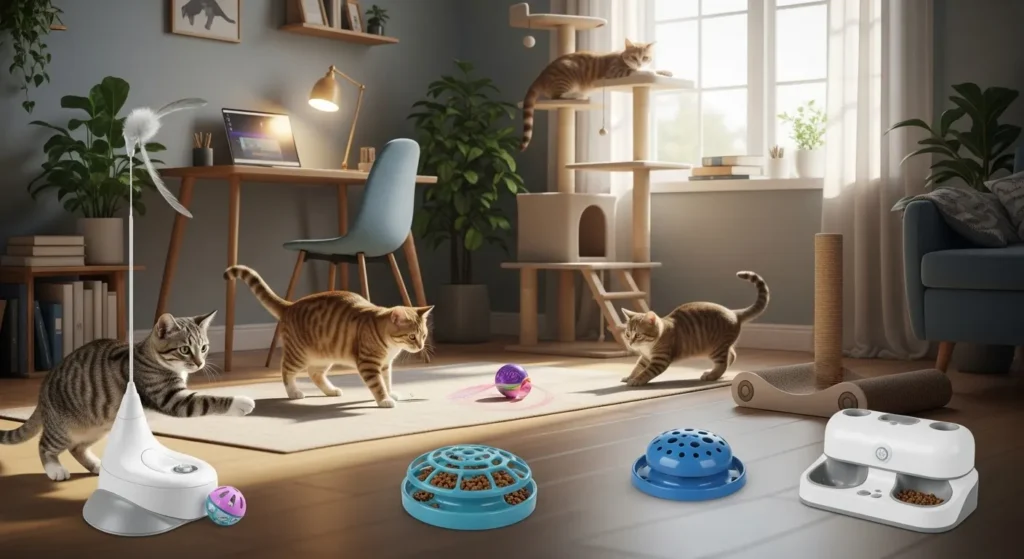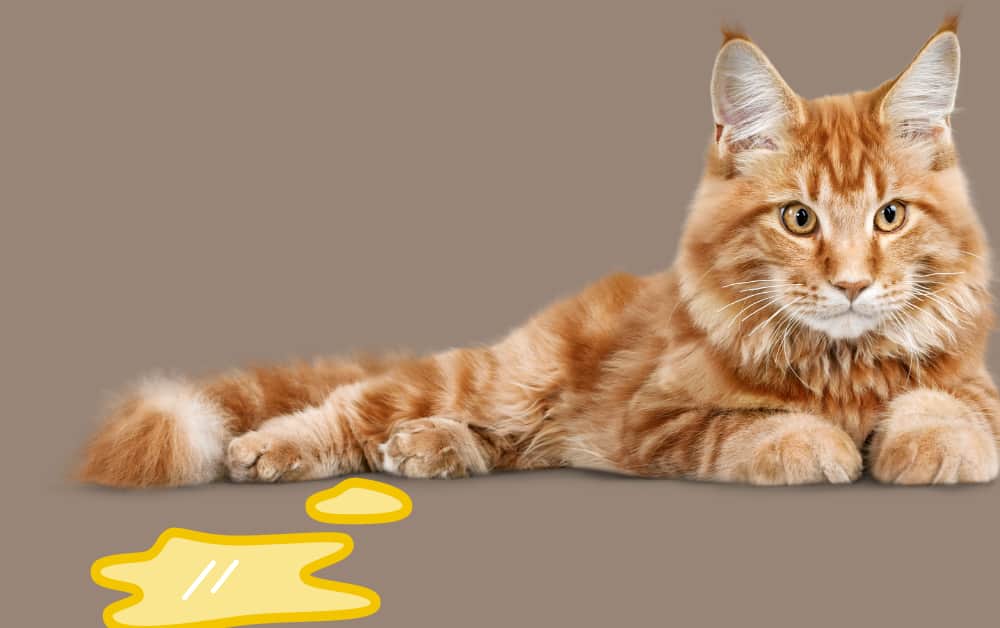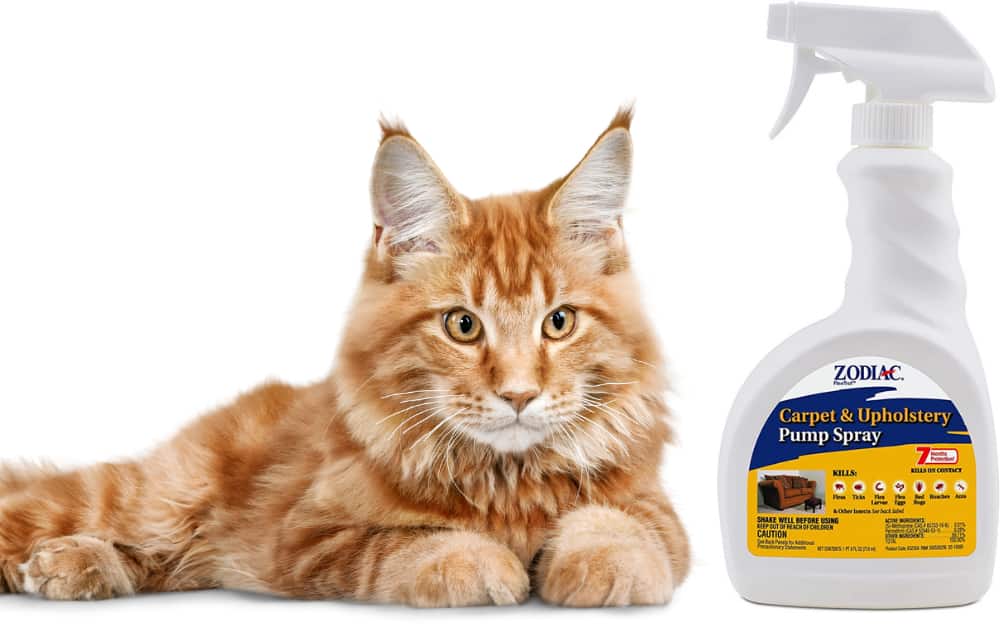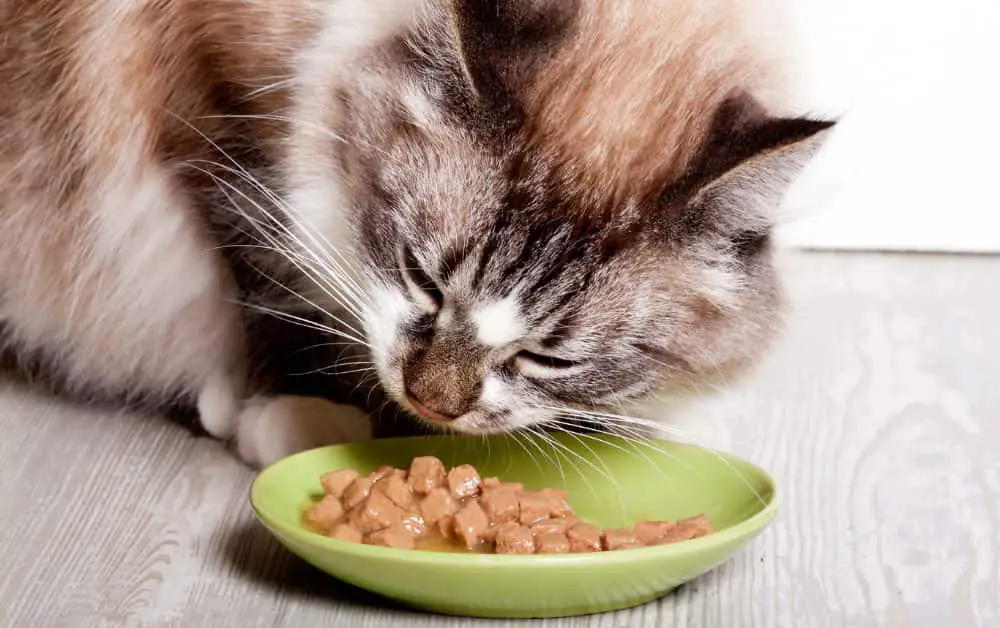Keeping your feline friend entertained while you’re away at work is essential for their physical health and mental wellbeing. Cats left alone for extended periods can develop boredom, anxiety, and destructive behaviors without proper stimulation.
By implementing strategic environmental enrichment, providing interactive toys, establishing engaging feeding routines, and leveraging technology, you can ensure your cat remains active, content, and mentally stimulated throughout the workday.
This comprehensive guide explores evidence-based approaches to keep your cat entertained, prevent behavioral issues, and maintain their overall happiness when home alone.
Key Takeaways
- Cats need both mental and physical stimulation to prevent boredom and related behavioral issues
- Environmental enrichment through vertical spaces, window perches, and hiding spots is crucial
- Puzzle feeders and food-dispensing toys engage cats’ natural hunting instincts
- Technology solutions like pet cameras and automated toys can provide interaction when you’re away
- Establishing a consistent routine helps reduce anxiety and keeps cats engaged
- Multiple cats can provide companionship and entertainment for each other
- Safety should always be the priority when selecting toys and creating entertainment spaces
Understanding Your Cat’s Needs When Alone
Cats may seem independent, but they still require stimulation and companionship to thrive. When left alone for 8+ hours while you’re at work, they can experience a range of emotions from boredom to separation anxiety. Understanding these needs is the first step toward creating an environment that keeps them entertained and content.
According to the American Association of Feline Practitioners, cats have five basic environmental needs: safety, resources, territory, social interaction, and stimulation. When you’re away, ensuring these needs are met becomes crucial for their wellbeing.
Signs of Cat Boredom and Anxiety
Before diving into solutions, it’s important to recognize when your cat might be experiencing boredom or anxiety:
- Excessive meowing or vocalization when you leave or return
- Destructive behaviors like scratching furniture or knocking items over
- Over-grooming to the point of creating bald patches
- Changes in eating habits
- Litter box issues
- Depression or lethargy
- Aggressive behavior when you return home
If you notice these signs, your cat may need more stimulation and entertainment options while you’re away.
How to Keep Cats Entertained While at Work
1) Creating a Stimulating Indoor Environment
Transforming your home into a feline paradise is one of the most effective ways to keep cats entertained while at work. A well-designed environment encourages natural behaviors like climbing, exploring, and hunting.
Vertical Spaces and Cat Trees
Cats naturally seek high vantage points to survey their territory. Installing vertical spaces satisfies this instinct and provides excellent exercise opportunities.
Image: A multi-tiered cat tree placed near a window with a cat perched on the top level
Consider these options for vertical spaces:
- Multi-tiered cat trees with platforms, hiding spots, and scratching posts
- Wall-mounted shelves and perches at varying heights
- Catwalks or wall-mounted pathways that allow exploration
- Window perches with secure mounting systems
The ASPCA recommends placing vertical spaces near windows to provide both height and visual stimulation from outdoor activities.
Window Entertainment
Windows offer free entertainment for cats through bird watching, people observation, and natural light changes.
To maximize window entertainment:
- Install sturdy window perches or beds
- Place bird feeders outside popular viewing windows
- Ensure window screens are secure to prevent accidents
- Consider window films that allow safe viewing while preventing falls
Hiding Spots and Secure Areas
Cats feel safest when they have places to hide and retreat. Creating multiple hiding spots throughout your home helps reduce anxiety and provides entertainment through exploration.
Effective hiding spots include:
- Cardboard boxes with entry holes cut out
- Covered cat beds or caves
- Paper bags (without handles)
- Spaces under furniture with easy access
- Dedicated cat tunnels or tents
2) Interactive Toys and Puzzle Solutions
Toys that engage your cat’s natural hunting instincts are excellent for keeping them entertained while you’re away. The key is providing toys that offer independent play opportunities.
Puzzle Feeders and Food-Dispensing Toys
Puzzle feeders combine mealtime with mental stimulation, requiring cats to “work” for their food. This mimics the hunting behavior cats would exhibit in the wild.
| Puzzle Feeder Type | Difficulty Level | Best For | Examples |
|---|---|---|---|
| Slow Feed Bowls | Easy | Cats who eat too quickly | Outward Hound Fun Feeder, Northmate Catch |
| Ball Dispensers | Easy-Medium | Active cats who like batting objects | PetSafe SlimCat, Catit Design Senses |
| Puzzle Boxes | Medium | Cats who enjoy problem-solving | Nina Ottosson by Outward Hound, Trixie |
| Electronic Timed Feeders | Easy | Cats on a feeding schedule | PetSafe 5-Meal, WOPET |
| Interactive Treat Mazes | Hard | Intelligent, persistent cats | Catit Design Senses Food Tree, Kong Wobbler |
According to Cornell Feline Health Center, puzzle feeders can help reduce obesity and boredom-related behaviors in indoor cats.
Independent Play Toys
Not all toys require human interaction. Many can keep cats entertained for hours while you’re away:
- Battery-operated moving toys that mimic prey
- Catnip-infused toys that provide sensory stimulation
- Balls and toys that can be batted around
- Feather wands that can be secured to furniture
- Self-rolling balls that change direction when hitting obstacles
Rotate toys every few days to maintain novelty and prevent boredom. The International Cat Care organization suggests storing toys in sealed bags with catnip between uses to refresh their appeal.
Automated and Electronic Toys
Technology offers excellent solutions for keeping cats engaged while you’re at work:
- Automatic laser toys (use with caution and never shine directly in eyes)
- Robotic mice that move unpredictably
- Motion-activated toys that respond when your cat approaches
- Electronic treat dispensers that can be controlled via smartphone
When selecting electronic toys, always prioritize safety by choosing products specifically designed for pets and avoiding small parts that could be swallowed.
3) Technology Solutions for Remote Interaction
Modern technology offers innovative ways to interact with your cat even when you’re not physically present.
Pet Cameras with Two-Way Communication
Pet cameras allow you to monitor your cat’s behavior and even interact with them remotely:
- Two-way audio lets you talk to your cat
- Some models include laser pointers or treat dispensers
- Motion detection alerts you when your cat is active
- Recording capabilities help you track behavior patterns
Image: A cat interacting with a pet camera with treat dispenser
Popular options include the Furbo Dog Camera (which works well for cats too), Petcube Play, and Wyze Cam. The Journal of Feline Medicine and Surgery has noted that remote interaction can help reduce separation anxiety in pets.
Automated Laser Toys
Automated laser toys can provide entertainment by mimicking prey movements:
- Look for models with automatic shut-off features
- Ensure the laser never points directly at your cat’s eyes
- Choose models with varied movement patterns
- Some advanced models can be controlled via smartphone apps
Important note: Some animal behaviorists express concerns about laser toys because they don’t provide a physical “catch” at the end of the hunt, which can be frustrating. If using laser toys, Cat Behavior Associates recommends ending play sessions with a physical treat or toy that your cat can catch.
4) Food-Based Entertainment Strategies
Using food as entertainment taps into your cat’s natural hunting instincts and provides mental stimulation throughout the day.
Meal Puzzles and Foraging Opportunities
Transforming mealtime into a hunting experience keeps cats engaged for extended periods:
- Hide small portions of food around the house for your cat to find
- Use multiple food puzzles of varying difficulty
- Consider freezing wet food in ice cube trays for longer-lasting entertainment
- Place food in different locations each day to maintain novelty
Scheduled Treat Dispensing
Timed treat dispensers can provide entertainment and positive reinforcement throughout the day:
- Program dispensers to release treats at different intervals
- Use them to create a routine that your cat can anticipate
- Some models allow remote activation via smartphone
- Consider puzzle-based treat dispensers that require manipulation
The American Veterinary Medical Association recommends ensuring that treats make up no more than 10% of your cat’s daily caloric intake to maintain a healthy weight.
5) Creating the Ideal Entertainment Schedule
Cats thrive on routine, and establishing a consistent entertainment schedule can help reduce anxiety while you’re away.
Morning Preparation Routine
Before leaving for work, engage your cat in an active play session:
- Dedicate 15-20 minutes to interactive play
- Use wand toys to simulate hunting
- End the session with a small meal or treat
- Provide a new toy or puzzle as you leave
- Leave behind an item with your scent
Midday Entertainment Options
If possible, arrange for midday stimulation:
- Set automated toys to activate during the day
- Program treat dispensers for midday release
- Consider a pet sitter visit for longer workdays
- Some cats enjoy watching specially designed cat videos
Evening Wind-Down
When you return home, establish a routine that signals the end of alone time:
- Greet your cat calmly
- Offer another play session
- Provide a meal
- Enjoy quiet time together
Multiple Cat Considerations
Having multiple cats can provide companionship and entertainment, but it requires careful planning.
Benefits of Multiple Cats
Cats with feline companions often:
- Experience less separation anxiety
- Engage in more natural play behaviors
- Groom each other (social bonding)
- Remain more active throughout the day
Introducing New Companions
If considering adding another cat to keep yours company:
- Introduce cats gradually over several weeks
- Ensure each cat has their own resources (food, water, litter, spaces)
- Monitor interactions closely when you’re away
- Consider personality compatibility when selecting a companion
The Humane Society provides detailed guidance on successfully introducing cats to each other.
Safety Considerations for Cat Entertainment
While keeping your cat entertained is important, safety should always be the priority.
Toy Safety Guidelines
When selecting toys for unsupervised play:
- Avoid toys with small parts that could be swallowed
- Remove strings, ribbons, or feathers that could be ingested
- Regularly inspect toys for damage
- Choose size-appropriate toys for your cat
- Avoid toxic materials or chemicals
Environmental Safety
Create a safe entertainment environment by:
- Securing windows and screens
- Removing toxic plants
- Keeping electrical cords protected or out of reach
- Ensuring climbing spaces are stable and secure
- Providing fresh water in multiple locations
Emergency Preparedness
Even with careful planning, emergencies can occur:
- Consider a pet camera with alerts
- Provide emergency contact information to neighbors
- Ensure your cat’s identification is current
- Keep a pet first aid kit accessible
- Know the location of the nearest emergency veterinary clinic
Advanced Enrichment Strategies
For cat owners looking to provide exceptional entertainment, consider these advanced strategies.
Outdoor Enclosures and “Catios”
Outdoor enclosures allow cats to experience the outdoors safely:
- Window boxes or small balconies can be converted
- Freestanding structures can be built in yards
- Tunnel systems can connect to indoor spaces
- Include climbing structures and hiding spots
Training and Mental Challenges
Cats enjoy learning and mental stimulation:
- Teach simple tricks using positive reinforcement
- Create obstacle courses or agility challenges
- Introduce scent work with hidden treats
- Consider clicker training for advanced mental stimulation
PetMD offers comprehensive guides on training cats using positive reinforcement techniques.
Budget-Friendly Entertainment Options
Keeping cats entertained doesn’t have to be expensive. Many effective solutions use items you already have at home.
DIY Toy Ideas
Create engaging toys from household items:
- Cardboard boxes with cut-out holes and hiding spots
- Paper bags (without handles) for hiding and exploration
- Toilet paper rolls filled with treats
- Ping pong balls for batting
- Crumpled paper balls for chasing
Low-Cost Environmental Enrichment
Enhance your cat’s environment without breaking the bank:
- Rearrange furniture to create new climbing opportunities
- Use towels or blankets to create new hiding spots
- Move cat furniture periodically to create novelty
- Use cardboard boxes to create temporary structures
FAQs
How long can cats be left alone safely?
Most adult cats can be left alone for 8-12 hours, but this varies by individual. Very young kittens, senior cats, or those with medical conditions may need more frequent check-ins. The Cornell Feline Health Center suggests that cats over 7 years old may need more attention as they age.
Will getting another cat help with boredom?
In many cases, yes. Cats are social animals and often benefit from feline companionship. However, success depends on the cats’ personalities and proper introduction. Some cats prefer being solitary, so consider your individual cat’s temperament before adding another pet.
Are automated laser toys safe for cats?
Automated laser toys can be safe when used properly. Choose models with automatic shut-off features, ensure the laser never points directly at your cat’s eyes, and limit play sessions. Some behaviorists recommend ending laser play with a physical toy or treat your cat can “catch” to prevent frustration.
How often should I rotate my cat’s toys?
Rotate toys every 3-4 days to maintain novelty. Store unused toys in a sealed container with catnip to refresh their appeal. This approach prevents boredom without the need for constant new purchases.
Final Thoughts
Keeping your cat entertained while at work requires a multi-faceted approach that addresses their physical, mental, and emotional needs. By creating a stimulating environment, providing appropriate toys, leveraging technology, and establishing routines, you can ensure your feline friend remains happy and content even when you’re away.
Remember that every cat is unique—what works for one may not work for another. Observe your cat’s preferences and behaviors, and be willing to adjust your strategies accordingly. With patience and creativity, you can create an environment that keeps your cat engaged, healthy, and thriving while you’re at work.
The investment in your cat’s entertainment and wellbeing pays off in a stronger bond, fewer behavioral issues, and the peace of mind that comes from knowing your feline companion is living their best life even when you can’t be there.











